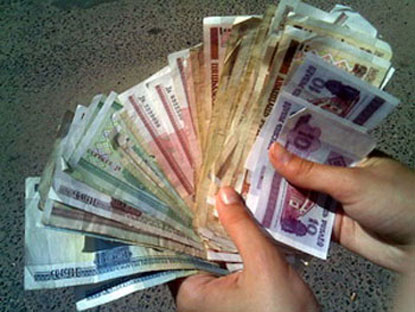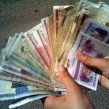
Rumors Of Devaluation Spell Trouble For Belarus
Publication: Eurasia Daily Monitor Volume: 8 Issue: 71
By:

On April 7 in Moscow, Russian and Belarusian officials on the Commission on Common Economic Space discussed the latter’s request for another loan from Russia of around $1 billion. Belarus has also requested $2 billion from the Anti-Crisis Fund of the Eurasian Economic Community (also controlled by Moscow) (www.naviny.by, April 6; Belorusskaya Delovaya Gazeta, April 7). The country has had a serious cash flow problem that is reflected in the depletion of foreign currency reserves, its deficit of trade balance, and its foreign debt, all of which have worsened sharply in 2011.
Belarus has followed its own economic path, declining to modernize its decrepit industries, 70 percent of which are state owned. In order to pay energy bills and to meet the average wage of $500 monthly – a key component of President Alyaksandr Lukashenka’s reelection campaign first reported last summer (Belarusian Telegraph Agency, June 18, 2010) – the government has been forced to continue its policy of soliciting foreign loans. For the average worker, however, salaries have been undermined by high inflation rates and rising prices.
The key issue is that profits are not being generated from within the country and workers are being paid higher wages from existing loans. Formerly these were forthcoming not only from the Russian Federation, but also from the IMF ($3.9 billion according to the agreement in 2009, which has now been disbursed), and potentially from the European Union ($3.8 billion was offered as an inducement for a free and fair election campaign but then withdrawn) (EDM, December 16, 2010). The condemnation of the election and arrests of oppositionists by both the EU and the United States has pushed the Lukashenka regime firmly into the orbit of Moscow.
According to investment banker Uladzimir Vasileuski, as cited in one of Belarus’ main business newspapers, the potential creditor, Russia, has both political and economic interests that it wishes to use as bargaining chips for a further loan to its neighbor. The political demands include Belarus’ long-delayed recognition of Abkhazia and South Ossetia (which would imperil the warm relations it currently has with the Georgia) and the sale of Belarus’ main assets, i.e. enterprises in oil reprocessing, oil technology, and machine building (BDG, April 7).
Some initial economic steps are already underway. The Belarusian side has assembled a proposal for a merger between its MAZ trucking company and Russian counterpart KAMAZ. However, whereas the Belarusians anticipated the formation of a joint company called “RosBelAvto,” in which Belarus would maintain 51 percent ownership, the Russians would prefer a deeper privatization to allow them more control (Narodnaya Volya, April 7). In fact, a concomitant problem is that Belarusian companies have taken no preparatory steps for privatization and their actual value is a matter for conjecture. There is, for example, a dispute over the $1 billion price being asked for the sale of the Belarusian telecommunications company MTS, which is currently owned 51 percent by the government and 49 percent by the Russian MTS cell phone company (www.telegraf.by, April 8). Russia has insisted that before further loans can be made available, Belarus must draw up an economic reform plan that includes spending cuts and measures to increase stabilization of its economy (www.naviny.by, March 25).
Russia’s concern is that the Belarusian economy is in free fall and the foreign trade deficit, which was $2.7 million in January 2010, has risen to $902.6 million (Belarusian Digest, March 10). Purchase of hard currency by individuals or enterprises has been restricted to 50,000 Euros ($72,000) until March 1, 2012 (www.telegraf.by, April 7). A Western source maintains that Belarus has sufficient foreign currency reserves for only about one month’s worth of imports (Bloomberg, March 25). According to Pyotr Prakapovich, Chairman of the National Bank of Belarus, currency reserves – now down to $3.7 billion (www.naviny.by, April 6) – need to be increased to $10 billion “to create a safety net for the economy” (www.pravo.by, March 24).
Since March 1, the National Bank has permitted businesses to trade the ruble at levels 10 percent lower than the official exchange rate ($1=BR 3,050) while assuring the public that no further devaluation is planned (Belorusy i Rynok, April 9). However, individual clients are reportedly using an exchange rate of almost 4,000 Belarusian rubles to the dollar (BDG, April 8). Moreover, Timothy Ash, head of emerging-market research with the Royal Bank of Scotland, maintains that the dwindling hard currency reserves may require 20 percent to 30 percent devaluation on the Belarusian ruble (Bloomberg, March 25)
The Belarusian public has reacted to the situation by purchasing gold, hard currency ($768.1 million in March alone), and other items to the extent that it is virtually impossible to purchase dollars or Euros in cities (www.telegraf.by, April 6). In addition, customers are buying up staple items at stores, such as sugar and sunflower oil, to the extent that these products are no longer available in some regions, despite government assurances that prices will not increase (www.charter97.org, April 8). Evidently, the population does not believe official reports, while also recalls the unannounced 20.5 percent currency devaluation in early 2009 (EDM, January 12, 2009).
Meanwhile, Belarus anticipates that the new loans will be in place by July. At best, they are papering over ever-widening cracks. Sooner or later a major devaluation of the currency seems inevitable. While economic reform accompanied by privatization might in theory make the country more attractive to potential investors, the current political climate dictates that there is only likely to be one major investor, namely Russia.




